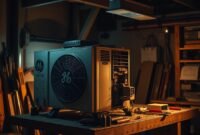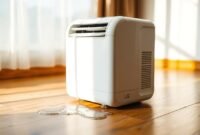Ever had your air conditioner start and stop quickly? It’s really frustrating. This problem can make your cooling system a big headache. Short cycling can also raise your energy bills and harm your AC.
Many homeowners face this issue. When your AC turns on and off fast, it’s not just annoying. It’s a sign of deeper problems that need fixing right away. Issues like refrigerant problems or electrical malfunctions can be serious.
In this guide, we’ll explore why short cycling happens and how to fix it. We’ll help you get your air conditioning working right again. Let’s fix your home’s comfort problem together.
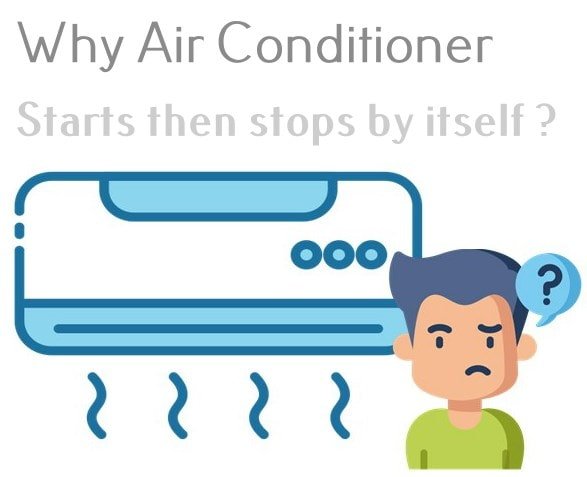
Understanding Short Cycling in Air Conditioning Systems
Air conditioning systems can face a problem called short cycling. This issue makes your cooling equipment work too hard. Short cycling happens when your AC turns on and off quickly, not letting it cool fully.
Short cycling makes your AC less efficient and more likely to break down. I’ll explain what happens and why fixing it fast is important.
What Happens During Short Cycling
Short cycling means your AC cools and stops fast. This messes up the cooling process. It leads to several issues:
- Frequent system starts and stops
- Insufficient time to cool your space effectively
- Increased wear on critical components
Why Short Cycling is a Serious Problem
Short cycling can seriously damage your AC. The constant starts and stops stress the compressor. Replacing it is very expensive.
Impact on Energy Efficiency
Fixing short cycling is key for saving energy. Repeated starts and stops use more electricity. This lowers your system’s performance.
| Short Cycling Impact | Potential Consequences |
|---|---|
| Compressor Stress | Premature Component Failure |
| Energy Consumption | Higher Utility Bills |
| Cooling Efficiency | Reduced Home Comfort |
Understanding short cycling helps you prevent and fix it. This avoids expensive repairs or needing a new system.
Low Refrigerant Levels: A Primary Cause of AC Malfunction
When your air conditioning system starts and stops often, it might be because of low refrigerant levels. As a professional HVAC technician, I’ve seen many cases where refrigerant problems cause big system issues.
Refrigerant is key to your air conditioning system. It pulls heat from inside your home and moves it outside, making your home cool. If refrigerant levels are low, your AC has trouble cooling your home right.
- Low refrigerant triggers the compressor’s low-pressure control
- Causes frequent system shutdowns
- Leads to inefficient cooling
Read also: AC Compressor Low Oil Symptoms
Why does my AC keep starting and stopping? Often, it’s because of refrigerant leaks. These leaks can happen in different parts of the system, like:
- Evaporator coils
- Condenser coils
- Refrigerant lines
- Connection points
Just adding more refrigerant isn’t a fix. A pro HVAC technician must find and fix the leak. This way, they prevent more damage and keep your AC working well.
If your cooling isn’t as good, you see ice on coils, or your system cycles too much, get it checked. Fixing refrigerant problems fast can save you money and make your AC last longer.
How Dirty Air Filters Affect Your AC Performance
A window air conditioner that turns on and off right away often points to a simple issue: the air filter. Many homeowners ignore this small but key part of their cooling system. They don’t see how much it affects performance.
When dust, pet hair, and debris clog your air filter, it’s a big problem. It makes your air conditioner work too hard. This causes it to turn on and off quickly as a safety measure.
Signs of a Clogged Air Filter
- Reduced airflow from vents
- Increased energy bills
- Unusual noises during operation
- Visible dust accumulation around air vents
- Inconsistent cooling performance
Read also: Mold in Air Conditioner – Symptoms and How to Prevent Them
Proper Maintenance Schedule
I suggest checking your air filter every 30-60 days. This depends on your home’s environment. Homes with pets or lots of dust need more frequent replacements.
| Environment | Filter Replacement Frequency |
|---|---|
| Average Home | Every 90 days |
| Home with Pets | Every 60 days |
| Homes with Allergies | Every 30-45 days |
Impact on System Efficiency
A clean air filter can boost your air conditioner’s efficiency by up to 15%. Keeping your filter clean prevents strain on your system. It also cuts down energy use and extends your air conditioner’s life.
Faulty Compressor Issues and Their Solutions
When your ac starts then stops immediately, the compressor might be the culprit. As the heart of your air conditioning system, a faulty compressor can cause significant performance problems. Understanding why your ac stop and start again is key to keeping your cooling system efficient.
Compressor issues can stem from various sources. I’ll break down the most common problems and solutions to help you diagnose and address them:
- Electrical connection problems
- Refrigerant pressure irregularities
- Mechanical wear and tear
- Overheating components
Compressor damage can occur when the system repeatedly starts and stops. Each startup requires a lot of energy and generates a lot of heat in the motor windings. This repeated stress can lead to premature system failure.
| Compressor Issue | Potential Symptoms | Recommended Action |
|---|---|---|
| Electrical Failure | Frequent tripping, no cooling | Professional electrical inspection |
| Refrigerant Imbalance | Inconsistent cooling, short cycling | Refrigerant level check and recharge |
| Mechanical Wear | Loud noises, reduced efficiency | Compressor replacement |
Professional HVAC technicians can diagnose complex compressor issues. If you notice persistent starting and stopping, unusual sounds, or reduced cooling performance, it’s best to schedule a system evaluation. This can prevent costly damage.
Air Conditioner Starts Then Stops After Only a Few Seconds: Common Triggers
It’s frustrating when your air conditioner starts and stops quickly. This problem, called short cycling, can come from many electrical and mechanical issues. Knowing what causes it can help you fix it before it gets worse.
Electrical System Problems
Electrical issues can mess up your air conditioner’s work. Some common problems include:
- Loose or damaged wiring connections
- Faulty capacitor preventing consistent power supply
- Circuit breaker complications
- Damaged electrical control board
Thermostat Malfunctions
Your thermostat controls your cooling system. If it goes wrong, your air conditioner might start and stop fast. Look out for these signs:
- Incorrect temperature readings
- Miscalibrated sensor
- Outdated or damaged thermostat unit
- Improper wire connections
Safety Switch Issues
Modern air conditioners have safety switches to protect them. These switches can sometimes cause early shutdowns:
- Pressure switch malfunction
- Overheating protection mechanism
- Low refrigerant level detection
- Blocked condensate drain switch
While these issues can give you clues, it’s best to get a pro to check it out. Experts can find and fix the real problem to avoid bigger damage to your cooling system.
The Impact of an Oversized AC Unit on Performance
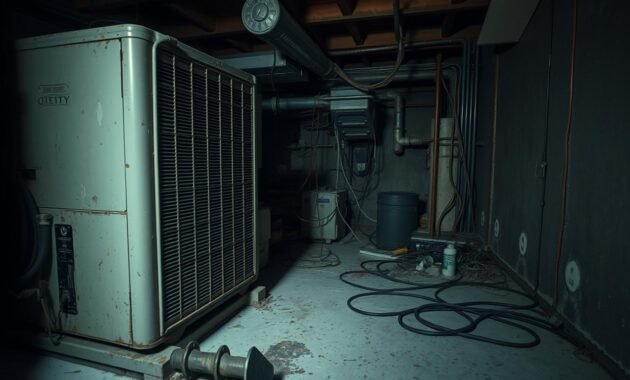
Choosing the right size air conditioning unit is key for your home’s comfort and energy use. An oversized AC can lead to more problems than benefits, affecting your cooling system’s performance.
An oversized AC unit cools your space too fast, causing short cycling. This quick cooling leads to several big issues:
- Inefficient moisture removal
- Increased energy consumption
- Frequent system startups and shutdowns
- Premature wear on system components
Many homeowners think bigger is always better. But, an AC that’s too large for your space will:
- Cool rooms unevenly
- Create uncomfortable humidity levels
- Waste significant energy
- Increase your monthly utility bills
It’s important to have a professional do a precise load calculation before installing. This ensures your home gets the cooling it needs, without waste.
Don’t let an oversized AC unit hurt your wallet or comfort. Get help from a qualified HVAC professional. They can find the perfect size for your home’s needs.
Dirty Condenser Coils and System Operation
Your air conditioning system needs clean condenser coils to work well. Dirty coils can make your cooling system less efficient. This leads to higher energy costs and less cooling.
Condenser coils are key for heat transfer. When they’re dirty, they can’t release heat well. This makes your AC work too hard, not cooling your home enough.
Identifying Dirty Coils
Spotting dirty coils early can prevent costly fixes. Watch for these signs:
- Reduced cooling efficiency
- Unusual noises from the outdoor unit
- Higher energy bills
- Visible dirt and debris on the coil surface
Effective Cleaning Methods
Here are some ways to clean your coils:
- Turn off power to the AC unit
- Remove visible debris with a soft brush
- Use commercial coil cleaner
- Rinse gently with a garden hose
| Cleaning Method | Difficulty | Recommended Frequency |
|---|---|---|
| Manual Brushing | Low | Every 3-4 months |
| Professional Cleaning | High | Annually |
| Commercial Coil Cleaner | Medium | Every 6 months |
Keeping your coils clean is key for your AC’s performance. It also helps your system last longer. If unsure, get a pro to clean and check your coils.
Blower Motor Problems and Their Solutions
When your AC turns on and quickly stops, the blower motor might be the culprit. This key part moves cool air around your home. If it breaks down, your cooling system can suffer a lot.
Many homeowners face blower motor issues that lead to short cycling and less comfort. Spotting these problems early can help avoid costly fixes and keep your home cool.
- Common blower motor problems including:
- Electrical connection failures
- Worn-out bearings
- Accumulation of dirt and debris
- Motor capacitor defects
It’s important to recognize warning signs. Listen for odd noises like squealing, grinding, or clicking when your AC starts. These sounds often mean the motor is about to fail and need quick help from a pro.
Regular maintenance is vital to avoid blower motor issues. I suggest getting your HVAC checked every year. This includes cleaning parts, checking electrical connections, and making sure everything works well. Keeping up with maintenance can make your system last longer and prevent sudden failures.
If you’re having trouble with your blower motor, don’t wait to call a professional HVAC technician. They can find and fix complex problems that might be hard to fix on your own.
Thermostat Location and Its Effect on AC Operation
Your thermostat is key to your HVAC system’s performance. Many don’t know that where you place it can greatly affect your AC’s behavior.
Finding the perfect spot for your thermostat is vital. The wrong spot can make your AC work too hard, leading to poor cooling and damage.
Optimal Placement Guidelines
- Install the thermostat on an interior wall
- Choose a central location in your home
- Keep it away from direct sunlight
- Avoid placing near air vents or windows
- Select a spot with consistent temperature
Common Placement Mistakes to Avoid
| Incorrect Location | Potential Problems |
|---|---|
| Near Kitchen | Heat from appliances causes false readings |
| Exterior Walls | Experiences temperature fluctuations |
| Direct Sunlight | Triggers inaccurate cooling cycles |
| Close to Air Vents | Disrupts temperature sensing |
A bad thermostat spot can mess up your AC’s temperature reading. This makes it start and stop too much, wearing it down and wasting energy.
If your AC keeps having problems, get a pro to check your thermostat’s spot. They can help fix it for better AC performance.
Read also: What Does Eco Mean on Air Conditioner?
The Importance of Regular HVAC Maintenance
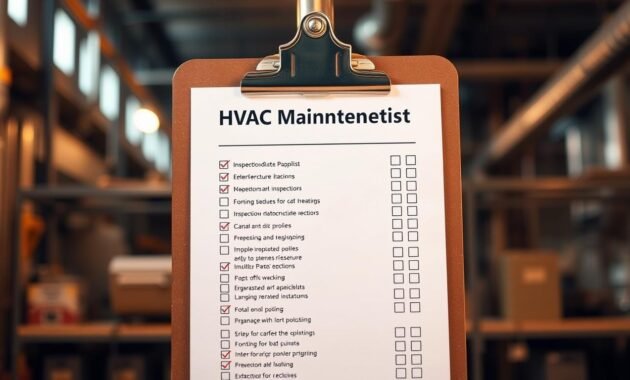
Keeping your air conditioning system in top shape is key to avoiding short cycling and keeping it running well. As an HVAC expert, I’ve seen many systems suffer from neglect. This can lead to expensive repairs and poor cooling.
Regular maintenance is your best defense against short cycling air conditioner issues. It’s like a health checkup for your AC system. Just as you visit a doctor to prevent serious health problems, your air conditioner needs regular care to avoid major breakdowns.
- Inspect and replace air filters every 1-3 months
- Clean condenser coils annually
- Check refrigerant levels
- Examine electrical connections
- Lubricate moving parts
I suggest scheduling professional maintenance at least once a year. Spring is the best time for a thorough inspection before summer’s heat arrives. This proactive approach helps you catch problems early and keeps your cooling system working well.
DIY maintenance can save money, but some tasks need a pro’s touch. Simple actions like changing filters and keeping the outdoor unit clean can greatly improve efficiency and prevent short cycling.
By spending a little time and effort on regular maintenance, you’ll make your air conditioner last longer. You’ll also cut down on energy bills and keep your home cool during the hottest months.
When to Call a Professional HVAC Technician
Dealing with air conditioning problems can be frustrating, like when your AC keeps stopping and starting. Some minor issues might be fixed at home. But, certain signs mean you need a pro’s help.
As a homeowner, knowing when to call a pro can save you money and headaches. HVAC experts have the skills and tools to find and fix complex problems. These issues might not be clear to everyone.
Critical Emergency Warning Signs
I suggest calling a professional HVAC technician right away if you see these warning signs:
- Persistent short cycling (why does my ac stop and start again)
- Strange burning smells from the AC unit
- Loud grinding or banging noises
- Complete system failure
- Electrical issues or frequent circuit breaker tripping
Choosing the Right HVAC Professional
When picking a professional HVAC technician, keep these points in mind:
| Criteria | What to Look For |
|---|---|
| Certification | NATE-certified technicians |
| Experience | 5+ years in HVAC services |
| Insurance | Fully licensed and insured |
| Reviews | Positive customer testimonials |
Investing in professional HVAC service can prevent damage and make your AC last longer. Don’t wait to get expert help if you’re unsure about your AC’s performance.
Conclusion
Dealing with an air conditioner that starts then stops after only a few seconds can be frustrating. I’ve looked into why this happens, from refrigerant issues to electrical problems. Knowing these reasons helps keep your home comfortable.
Read also: Reasons Why Air Conditioner Starts Then Stops
Regular maintenance is key to avoiding short cycling. If your AC turns on and off quickly, it means there’s a problem. A professional can fix these issues fast, saving you money and discomfort.
Preventing problems is better than fixing them. Regular check-ups, clean air filters, and quick fixes can make your AC last longer. Early action can stop bigger issues and keep your AC working well all summer.
Understanding your air conditioning system’s health is worth it. With the right knowledge and care, your AC will run efficiently. This keeps your home cool and comfortable when you need it most.

